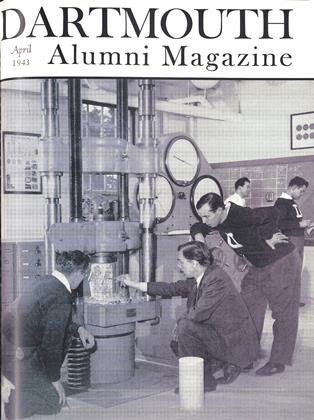MR. ROLLINS REPORT SHOWS THATPHI BETA KAPPAS LIVE LONGER
PHI BETA KAPPA graduates outlive their classmates by from one to eighteen years, according to a study made by Weld A. Rollins, secretary of the class of 1897. In only one of the fifteen Dartmouth classes between 1797 and 1897 which Mr. Rollins used as a basis for his report was the average length of life of the non Phi Beta Kappa members greater than that of dieir more intellectually inclined brothers.
In the class of 1797, numbering 13 Phi Beta Kappas and 16 other graduates, the excess of life in years for the former was 8.1, while in the class of 1798 it jumped to 18.8. This margin fluctuated from year to year until 1850, when the rest of the graduates outlived the Phi Beta Kappas by an average of 1.5 years. In explanation of this Mr. Rollins reports that three of the Phi Beta Kappas died in their thirties, an unusual occurrence, due, perhaps, to the Civil War.
In the case of his own class, 1897, MrRollins found that while 43.5% of the total graduates of the class have died, not more than 30% of the Phi Beta Kappas are dead. The average length of life of the Phi Beta Kappas over the 100 year period has been 68.4 years, and that of the other graduates, 61.6 years.
Although it is impossible to give an arbitrary reason why Phi Beta Kappas consistently outlive their fellow graduates, Mr. Rollins suggests a number of possible causes. There may be a positive correlation between a well-constructed mind and a sound body, or again, the cause may be occupational. Phi Beta Kappas may find it easier to get and to hold good jobs and are, therefore, free from physical dangers and emotional strain. It has been discovered that annuitants live longer than others, presumably because their old age is free from financial worry.
It may be a matter of weighting. Students handicapped by ill health, unfortunate habits, or anything else cannot make Phi Beta Kappa grade; the careless, reck less, adventurous do not care to. These groups are, therefore, in the non Phi Beta Kappa section and weight it down. Probably, however, a combination of factors accounts for the longevity of the highranking scholars.
One cheering result of Mr. Rollins study is the discovery that the average life span of both groups has been gradually lengthening. Today, the American Experience Mortality Table shows an expectation of life at 70 of 8.48 years. According to his analysis of the fifteen classes, Mr. Rollins says, the expectation of life at 70 will be a year more than that.
 View Full Issue
View Full Issue
More From This Issue
-
 Article
ArticleDaniel Webster and Dartmouth
April 1943 By CARROLL A. WILSON -
 Lettter from the Editor
Lettter from the Editor'Round the Girdled Earth
April 1943 -
 Article
ArticleDartmouth War Directory
April 1943 -
 Class Notes
Class Notes1918
April 1943 By ERNEST H. EARLEY, RICHARD A. HOLTON -
 Class Notes
Class Notes1939
April 1943 By ROBERT DICKGIESSER, J. MOREAU BROWN -
 Class Notes
Class Notes1931
April 1943 By CHARLES S. MCALLISTER, CHARLES A. GRISTEDE







